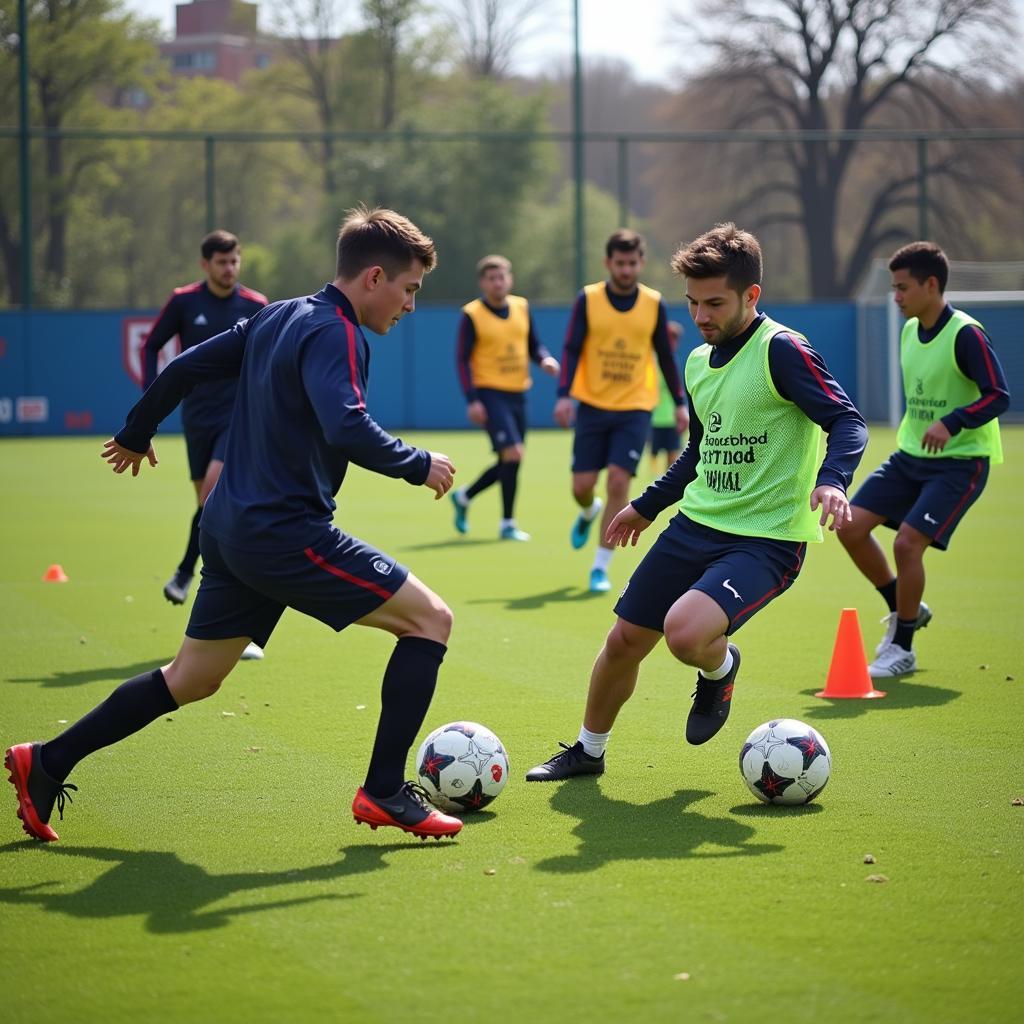How Football Players Train: A Striker’s Perspective
November 25, 2024Football training is a crucial aspect of a player’s life, dictating their performance on the pitch. This article delves into the training methods football players employ, offering insights from my own experience as a striker.
Physical Conditioning: The Foundation of Football Training
Physical conditioning forms the bedrock of any footballer’s training regime. It encompasses various aspects crucial for optimal performance. Strength training, for instance, is essential for building power and resilience. This involves exercises like squats, deadlifts, and bench presses. Speed and agility drills are equally important. These drills help players react quickly, change direction efficiently, and maintain balance. Cone drills, ladder drills, and shuttle runs are common examples. Endurance training, focusing on cardiovascular fitness, is also vital. Long-distance runs, interval training, and cycling build stamina, allowing players to perform consistently throughout a match. Flexibility and mobility exercises are incorporated to prevent injuries and enhance range of motion. These exercises often include yoga, Pilates, and dynamic stretching routines.
Technical Skills: Honing the Craft
Technical skills are what separate good players from great ones. Ball control is paramount, and players dedicate countless hours to mastering it. This includes drills focusing on dribbling, passing, and first touch. Shooting accuracy is crucial for strikers like myself. We practice different shooting techniques, aiming for power, placement, and finesse. This involves repetitive drills from various angles and distances. Heading, another key skill, requires timing and precision. We practice heading drills to improve accuracy and power, focusing on connecting with the ball cleanly. Passing accuracy is also vital, as it dictates the flow of the game. Players practice short passes, long passes, and through balls to enhance their distribution skills.  Football players practicing dribbling and passing drills
Football players practicing dribbling and passing drills
Tactical Awareness: The Mind Game
Tactical awareness is just as important as physical and technical prowess. Understanding formations and strategies is crucial for team cohesion. Players study different formations and learn how to adapt to various tactical setups. Analyzing opponents is another important aspect. We study their strengths, weaknesses, and playing styles to anticipate their moves on the field. Decision-making under pressure is a skill honed through experience and practice. Players participate in game-like scenarios to improve their decision-making speed and accuracy. Communication on the field is essential. We practice communicating effectively with teammates, providing instructions, and offering support.
Recovery and Nutrition: Fueling the Machine
Recovery and nutrition play a vital role in maintaining peak performance. Adequate rest and sleep are crucial for muscle repair and overall well-being. Nutrition is equally important. A balanced diet, rich in protein, carbohydrates, and healthy fats, provides the necessary fuel for training and matches. Hydration is also vital. Players drink plenty of water throughout the day, especially before, during, and after training sessions.
How Do Football Players Train for Speed?
Speed training in football often involves sprint drills, plyometrics, and agility exercises.
How Do Football Players Train for Strength?
Strength training programs include weightlifting, bodyweight exercises, and resistance training.
Conclusion: The Journey to Excellence
Football training is a continuous process of improvement. It requires dedication, discipline, and a relentless pursuit of excellence. From physical conditioning to tactical awareness, every aspect contributes to a player’s overall performance. By focusing on these key areas, football players strive to reach their full potential and achieve their goals on the field. Remember, consistent hard work and dedication are the keys to success in football.
FAQ
- What are the key components of football training? (Physical conditioning, technical skills, tactical awareness, recovery, and nutrition.)
- How important is strength training for football players? (Essential for power, resilience, and injury prevention.)
- What are some common speed and agility drills? (Cone drills, ladder drills, and shuttle runs.)
- Why is tactical awareness important in football? (Crucial for understanding formations, strategies, and opponent analysis.)
- How does nutrition contribute to a footballer’s performance? (Provides the necessary fuel for training and matches, supports recovery, and maintains overall health.)
- What type of recovery methods are important for football players? (Adequate rest, sleep, proper hydration, and nutrition.)
- How can I improve my football skills? (Consistent practice, focusing on both technical and tactical aspects, and maintaining a healthy lifestyle.)
For further assistance, please contact us: Phone: 0396443476, Email: [email protected], or visit us at 23 Tháng 3, Đắk Nia, Gia Nghĩa, Đắk Nông, Việt Nam. We have a 24/7 customer service team.